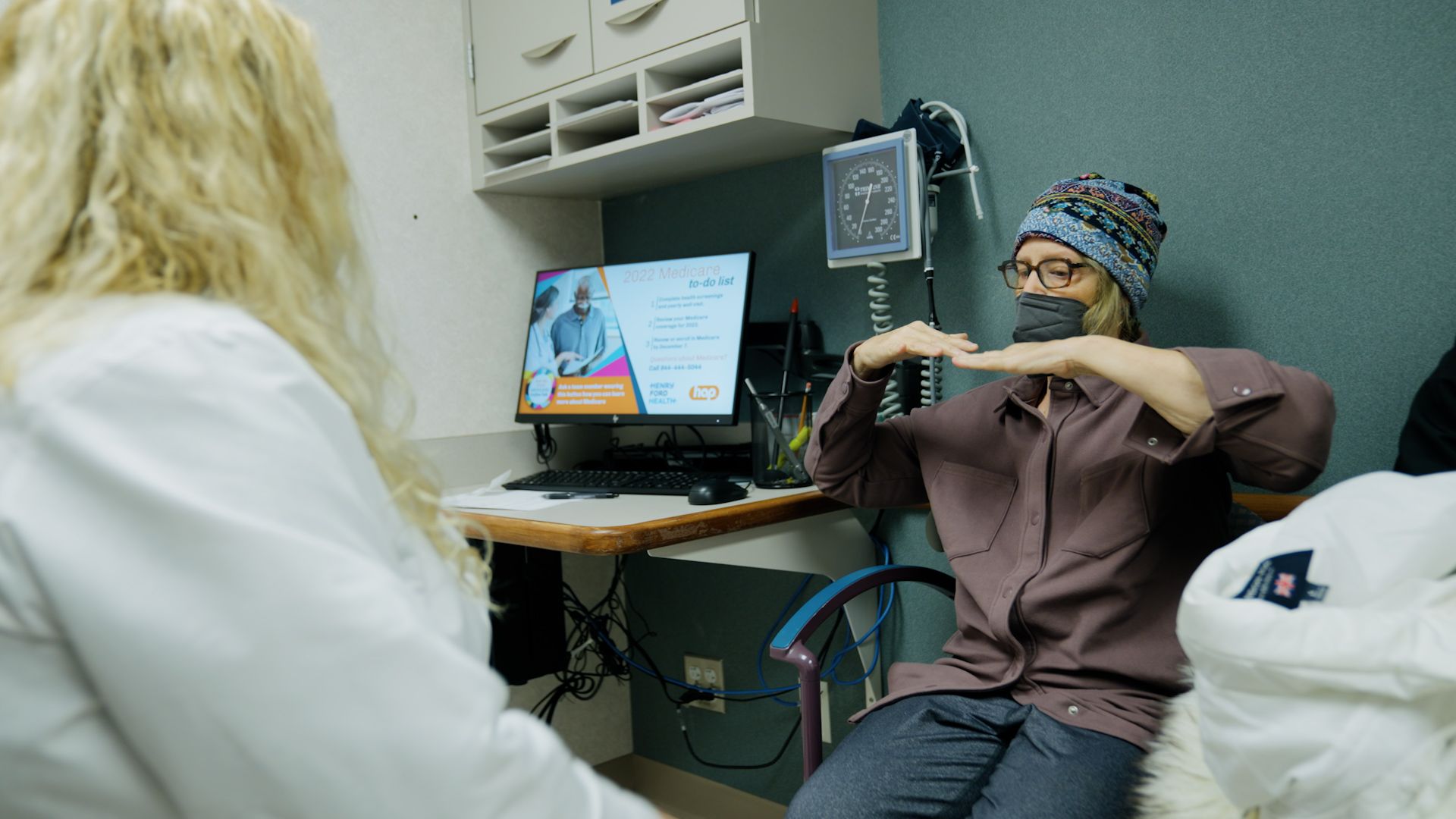Essential Tremor
The shaking that occurs with essential tremor can disrupt your everyday activities, but the right treatment can help. At Henry Ford Health, our specialists are national leaders in expert, compassionate care for people with this frustrating condition.
What is essential tremor?
Essential tremor is a neurological (nervous system) disorder that causes involuntary (unintended and uncontrollable), rhythmic shaking, or tremors. It occurs most often in people age 65 and older, although it can develop at any age. Essential tremor most commonly affects the hands, but it can occur in the head, face, voice box, arms or almost any part of the body.
Virtual Care
Essential tremor symptoms
Although each person’s experience with symptoms is unique, almost everyone has tremors that:
- Begin gradually and worsen over time
- Happen more when you move and less when you rest
- Worsen with caffeine, fatigue, stress or certain medications
- May improve if you drink a small amount of alcohol, such as wine
- Affect each side of your body in different ways
Some signs and symptoms of essential tremor include:
- Tremors that are most noticeable in your hands
- Difficulty writing, using tools or doing other tasks with your hands
- Shaking or quivering sound in your voice
- Uncontrollable head-nodding
- Tremors in your legs or feet, in rare cases
Essential tremor care at Henry Ford: Why choose us?
Essential tremor often gets mistaken for Parkinson’s disease, so it’s important to see a specialist with experience in evaluating and diagnosing movement disorders. Our neurologists are experts in distinguishing among symptoms to diagnose essential tremor.
Highlights of our program include:
- Genetic testing: If tremors run in your family, genetic testing can help. We refer you to genetic counselors who help you understand your family’s risks related to essential tremor. Testing can show known genetic mutations (changes in genes).
- Comprehensive treatment options: We provide a complete range of treatments and services to help minimize shaking and improve your ability to do your daily activities.
Essential tremor evaluation
No specific test can confirm essential tremor. Since it is easily confused with Parkinson's disease, our neurologists do a thorough evaluation. We begin with a physical exam and ask you about your symptoms and personal and family medical history.
The evaluation helps us decide what other tests you may need, such as:
- Neurologic exam: We evaluate how well your nervous system is functioning by testing your muscle movements, strength, reflexes and other factors.
- Lab tests: We test small samples of your blood or urine for factors that can help rule out or identify other causes of tremors. These causes may include thyroid disease, certain medications, anxiety or alcohol misuse.
- Functional tests: Simple tests, such as holding a pencil or drinking from a cup, can provide more details about the tremor. We may ask you to write, draw a simple design, or place your finger on the tip of your nose.
- Genetic testing: Based on your family medical history, we may recommend genetic testing to look for known genetic mutations related to essential tremor.
- Dopamine transporter (DaT) scan: DaTscan is brain imaging that can help distinguish between essential tremor and Parkinson’s disease. A DaTscan study shows brain chemistry changes, such as reduced dopamine, a sign of Parkinson’s disease.
Essential tremor treatment
You may not need treatment if essential tremor symptoms aren’t affecting your daily activities. If symptoms worsen, we offer several surgical and nonsurgical treatment options to help you find relief. You may need more than one type of treatment.
Nonsurgical treatments for essential tremor
Our nonsurgical treatments include:
- Medications: Propranolol, a blood pressure medication, and certain anti-seizure medications can help ease trembling. Anti-anxiety medications, such as clonazepam, are helpful for people whose tremors worsen with anxiety.
- Botox® injections: Botulinum toxin, or Botox, injections can improve head and voice tremors. Learn more about Botox for neuromuscular disorders.
- Rehabilitation therapies: Our experienced physical and occupational therapists help you improve muscle control, strength and coordination and minimize hand tremors. Read about our neurological rehabilitation.
- Integrative medicine therapies: Acupuncture, chiropractic care, massage, tai chi, yoga and other therapies can help you manage stress and relax your muscles. Find out what we offer at the Center for Integrative Medicine.
Learn more about our nonsurgical therapies for movement disorders.
Deep brain stimulation surgery for essential tremor
We may recommend surgery if you have more severe symptoms and nonsurgical treatments don’t provide enough relief. Henry Ford is a leader in deep brain stimulation (DBS) surgery, and our neurosurgeons have extensive expertise in this procedure.
During DBS, the surgeon implants electrodes in the brain to deliver controlled electrical impulses that help control tremors. Learn more about deep brain stimulation for essential tremor and other movement disorders.
Find out more about our process for movement disorder evaluation and treatment options.

“My body was still for the first time in 50 years.”
Deep brain stimulation (DBS) proves life-changing for this former teacher with disabling essential tremor.
.svg?iar=0&hash=F6049510E33E4E6D8196C26CCC0A64A4)

/hfh-logo-main--white.svg?iar=0&hash=ED491CBFADFB7670FAE94559C98D7798)
